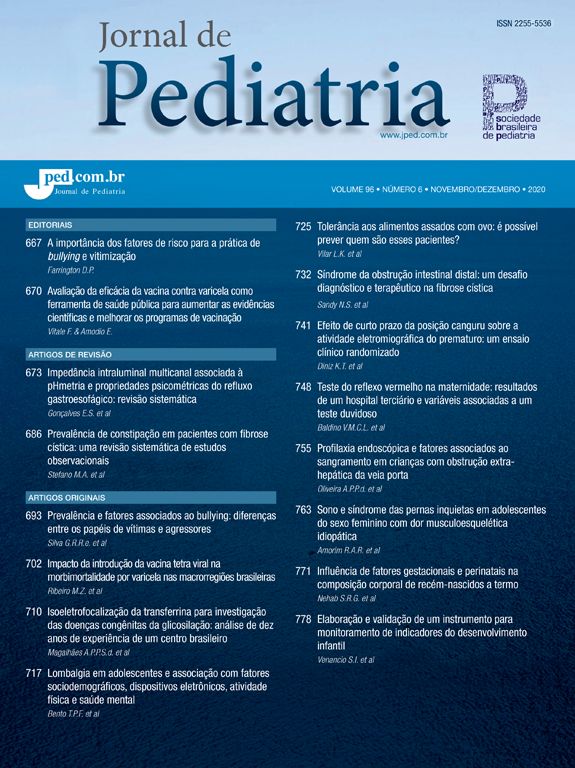To validate the Portuguese version of the Children's Sleep Habits Questionnaire (CSHQ-PT) and compare it to the versions from other countries.
MethodsThe questionnaire was previously adapted to the Portuguese language according to international guidelines. 500 questionnaires were delivered to the parents of a Portuguese community sample of children aged 2 to 10 years old. 370 (74%) valid questionnaires were obtained, 55 children met exclusion criteria and 315 entered in the validation study.
ResultsThe CSHQ-PT internal consistency (Cronbach's α) was 0.78 for the total scale and ranged from 0.44 to 0.74 for subscales. The test-retest reliability for subscales (Pearson's cor-relations, n=58) ranged from 0.59 to 0.85. Our data did not adjust to the original 8 domains structure in Confirmatory Factor Analysis but the Exploratory Factor Analysis extracted 5 factors that have correspondence to CSHQ subscales.
ConclusionThe CSHQ-PT evidenced psychometric properties that are comparable to the versions from other countries and adequate for the screening of sleep disturbances in children from 2 to 10 years old.
Validar a versão em português do Questionário de Hábitos de Sono das Crianças (CSHQ-PT) e compará-la às versões de outros países.
MétodosO questionário foi anteriormente adaptado para o português de acordo com as diretrizes internacionais. 500 questionários foram entregues aos pais de uma amostra populacional portuguesa de crianças com idade entre 2 e 10 anos. 370 (74%) questioná- rios válidos foram obtidos, 55 crianças apresentaram critérios de exclusão e 315 foram aceitas no estudo de validação.
ResultadosA consistência interna do CSHQ-PT (α de Cronbach) foi de 0,78 para a escala completa e variou de 0,44 a 0,74 nas subescalas. A confiabilidade teste-reteste das subes- calas (correlações de Pearson, n = 58) variou de 0,59 a 0,85. Nossos dados não foram com- patíveis com a estrutura original de 8 domínios na Análise Fatorial Confirmatória, porém a Análise Fatorial Exploratória extraiu 5 fatores que correspondem a subescalas do CSHQ.
ConclusãoO CSHQ-PT apresentou propriedades psicométricas comparáveis às versões de outros países e adequadas para triagem de problemas do sono em crianças de 2 a 10 anos de idade.
Como citar este artigo: Silva FG, Silva CR, Braga LB, Neto AS. Portuguese Children's Sleep Habits Questionnaire - validation and cross- cultural comparison. J Pediatr (Rio J). 2014;90:78-84.








